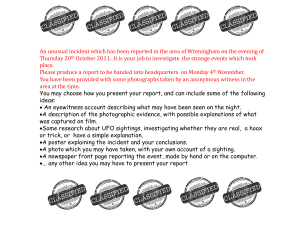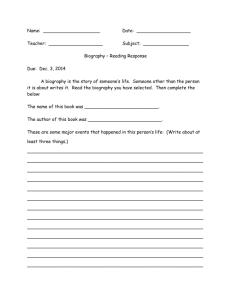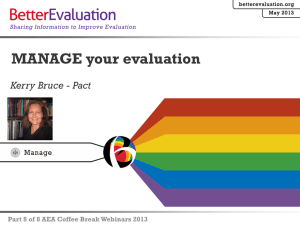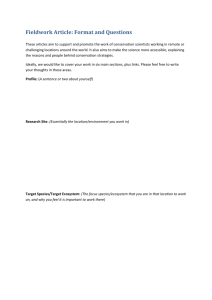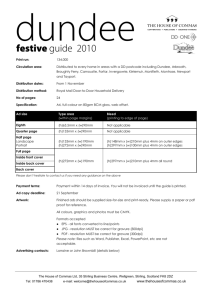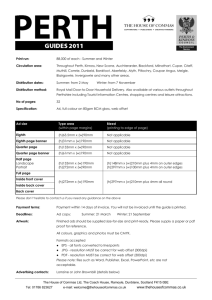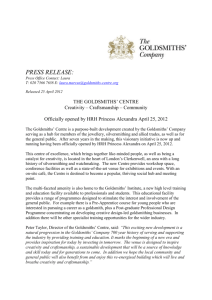Your Biography (150 words max)
advertisement
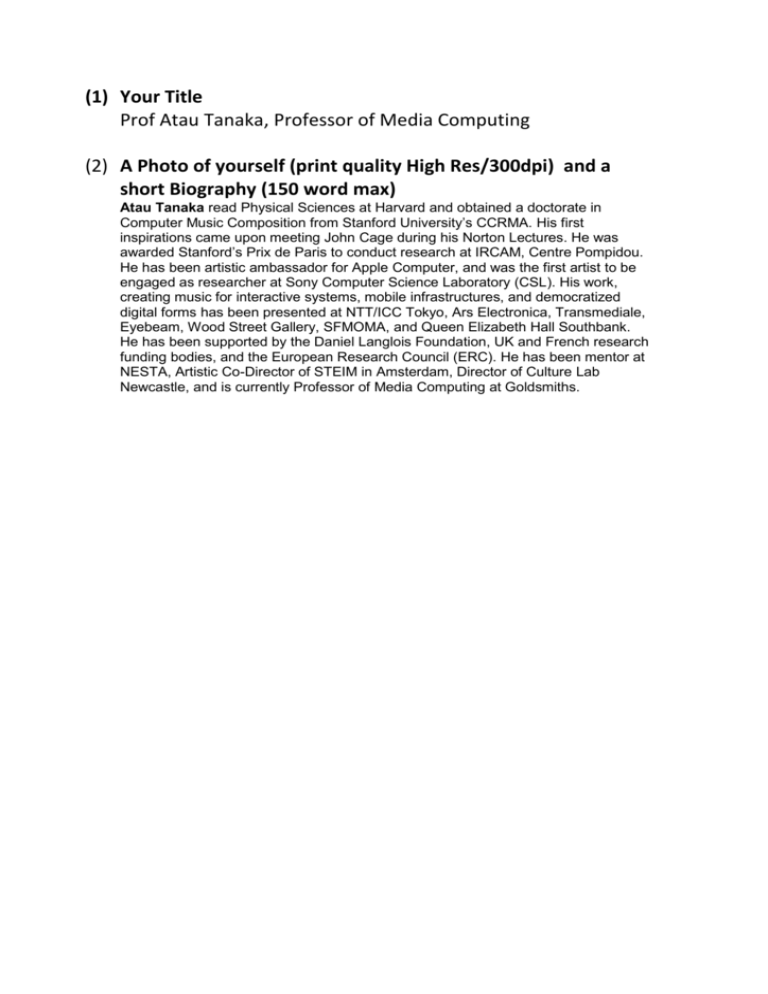
(1) Your Title Prof Atau Tanaka, Professor of Media Computing (2) A Photo of yourself (print quality High Res/300dpi) and a short Biography (150 word max) Atau Tanaka read Physical Sciences at Harvard and obtained a doctorate in Computer Music Composition from Stanford University’s CCRMA. His first inspirations came upon meeting John Cage during his Norton Lectures. He was awarded Stanford’s Prix de Paris to conduct research at IRCAM, Centre Pompidou. He has been artistic ambassador for Apple Computer, and was the first artist to be engaged as researcher at Sony Computer Science Laboratory (CSL). His work, creating music for interactive systems, mobile infrastructures, and democratized digital forms has been presented at NTT/ICC Tokyo, Ars Electronica, Transmediale, Eyebeam, Wood Street Gallery, SFMOMA, and Queen Elizabeth Hall Southbank. He has been supported by the Daniel Langlois Foundation, UK and French research funding bodies, and the European Research Council (ERC). He has been mentor at NESTA, Artistic Co-Director of STEIM in Amsterdam, Director of Culture Lab Newcastle, and is currently Professor of Media Computing at Goldsmiths. SPEAKER INORMATION: (1) Your Title Heather Kelley (2) Organisation Name Carnegie Mellon University (3) Company logo(s) if appropriate (4) A Photo of yourself (print quality High Res/300dpi) (5) Title of your talk Close Enough to Touch: Embodied Games (6) Brief Synopsis of your talk (150 words max) (7) Your Biography (150 words max) Heather Kelley (aka moboid) is a media artist and video game designer. She is co-founder of the Kokoromi experimental game collective, with whom she produces and curates the annual Gamma game event promoting experimental games as creative expression in a social context. She is regular jury member for different computer gaming festivals (such as Indiecade) and keynote speaker (at events like FMX Conference on Animation, Effects, Games and Interactive Media 2010 in Stuttgart). Her career in the games industry has included AAA next-gen console games, interactive smart toys, handheld games and web communities for girls. She has created interactive projections using game engines such as Quake and Unreal. Heather Kelley was Creative Director on the UNFPA Electronic Game to End Gender Violence, at the Emergent Media Center at Champlain College in Burlington, Vermont. For seven years, Heather served as co-chair of the IGDA's Women in Game Development Special Interest Group. In May 2014 she joined the Entertainment Technology Center at Carnegie Mellon University as an Assistant Teaching Professor. (8) Photo of your work (print quality/High Res/300dpi) (1) Your Title Memo Akten (2) Organisation Name Goldsmiths IGGI Centre for Doctoral Training (3) Company logo(s) if appropriate (4) A Photo of yourself (print quality High Res/300dpi) (5) Title of your talk Data Dramatization (6) Brief Synopsis of your talk (150 words max) Inspired by the processes that shape our lives, Memo uses the tools of science as a lens to the world. Through visual, sonic and behavioural metaphors he creates artefacts that reveal, extract, amplify and abstract the unseen harmonies, tensions and poetry found within these phenomena. His work plays at the boundaries between abstract and figurative, and spans multiple disciplines including images, videos, sound, light, digital sculptures, dance, large scale installations, performances, software and online works. (7) Your Biography (150 words max) Memo Akten (b. 1975) is an artist and engineer born in Istanbul (TR), currently based in London (UK). He develops systems that abstract behaviour to create unfamiliar familiarities and encourage new perceptions on our relationship to science, nature, technology and culture. In 2013 his work FORMS won the Golden Nica at the Prix Ars Electronica. His work has been exhibited and performed around the world at venues such as The Victoria & Albert Museum (London, UK), Royal Opera House (London, UK), Garage Center for Contemporary Culture (Moscow, RU), La Gaîté lyrique (Paris, FR), Holon Museum (Tel Aviv, IL), EYE Film Institute (Amsterdam, NL), STRP Biennial (Eindhoven, NL), FILE Festival (Sao Paolo, Rio, BR), Lisbon Architecture Triennale (Lisbon, PT), Royal Festival Hall (London, UK), Queen Elizabeth Hall (London, UK). (8) Photo of your work (print quality/High Res/300dpi) (1) Your Title Dr Freida Abtan, Programme Convenor Music Computing (2) Organisation Name Goldsmiths Department of Music (3) Company logo(s) if appropriate (4) A Photo of yourself (print quality High Res/300dpi) (5) Title of your talk Dislocated Presence (6) Brief Synopsis of your talk (150 words max) Technologies which capture and represent human gestures don't all function the same way and reduce human engagement and performance to different essential properties. What is human presence when it's no longer centred on the body? How do different kinds of representations speak about their origins? (7) Your Biography (150 words max) Freida Abtan is a Canadian, multi-disciplinary, artist and composer whose work bridges electroacoustic composition, immersive scenography, sensor system design, and multimedia performance. Her videomusic and audio work have been featured at festivals internationally, and can be found on releases from both United Dairies / Jnana Records and Finite State Recordings. Freida leads the Music Computing programme at Goldsmiths, University of London. (8) Photo of your work (print quality/High Res/300dpi) (1) Your Title Prof Mark d’Inverno, Pro-Warden of Research & Enterprise (2) Organisation Name Goldsmiths (3) Company logo(s) if appropriate (4) A Photo of yourself (print quality High Res/300dpi) (5) Title of your talk Creative Feedback (6) Brief Synopsis of your talk (150 words max) Arguably one of the most important activities of universities is to provide environments where students develop the wide variety of social and intellectual skills necessary for giving and receiving feedback. We are not talking here about the rather dreary compliance-inflected pre-existing notions of feedback but the profoundly creative and human act of giving and receiving feedback in order validate, challenge and inspire. So as to emphasise we are talking about this kind of feedback, we coin the term “creative feedback”. In this talk I will aim to characterise its qualities and take a historical look at the concepts of creativity/creative in order to ground our use of this specific term. I will then present Music Circle - that has been developed as part of a large European grant - which is an innovative technology supporting creative feedback in communities of learners that has been successfully employed with several thousand engaged users. (7) Your Biography (150 words max) Mark d’Inverno is Professor of Computer Science and Pro-Warden for Research and Enterprise at Goldsmiths, University of London, and for four years between 2007 and 2011 was head of the Department of Computing which has become one of Europe’s leading centres for interdisciplinary research and teaching especially in the arts increasingly in the social sciences. He holds an MA in Mathematics and an MSc in Computation from the University of Oxford and a PhD from University College London entitled “Agents, Agency and Autonomy”. He has published over 100 articles including authored and edited books, chapters in books, and journal and conference articles leading interdisciplinary computer science research projects in multi-agent systems, biological systems, music, art, design, education and social media. During 2011/12 he completed a research sabbatical as visiting fellow at the Artificial Intelligence Research Institute in Barcelona and at Sony Computer Science Laboratory in Paris. He is currently the Principal or Co-investigator on a range of EU and UK projects spanning intelligent agents, social systems, shared experiences, creativity, cultural engagement and music education. (8) Photo of your work (print quality/High Res/300dpi)

